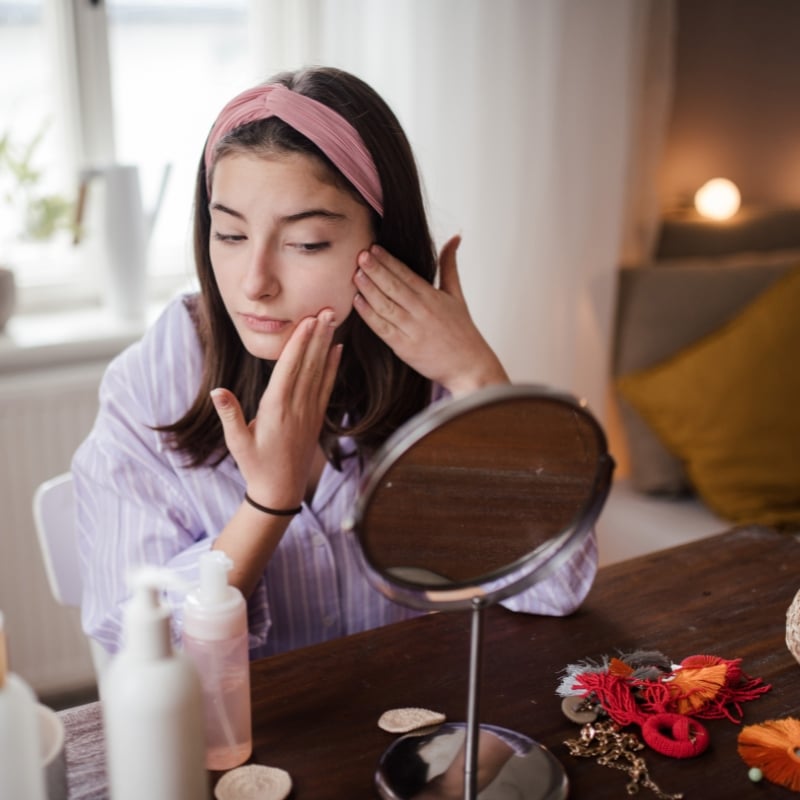In March 2025, the U.S. Food and Drug Administration (FDA) issued a public alert about a small number of acne treatments contaminated with benzene, a known cancer-causing chemical. This development followed testing on popular products containing benzoyl peroxide, a common acne-fighting ingredient found in over-the-counter creams, spot treatments, and cleansers.
Although the majority of the products tested were found to be safe, several were voluntarily recalled from store shelves. For people who use these products regularly, the news prompted concern and questions:
- Is your skincare routine still safe?
- Should you throw anything away?
- What exactly is benzene, and how does it end up in acne products?
This blog answers those questions with clarity and detail. We break down what the FDA and independent labs found, how benzene exposure can happen, and what this means for your health and skincare habits moving forward.
FDA Findings Are a Targeted Recall, Not a Widespread Risk
The FDA conducted tests on 95 acne treatment products that contain benzoyl peroxide, a popular ingredient used to treat acne. According to the agency, more than 90% of products tested had either no detectable benzene or levels that were extremely low. However, six products exceeded acceptable limits and were voluntarily recalled from retail shelves.
The affected brands included the following:
- La Roche-Posay Effaclar Duo Dual Action Acne Treatment
- Walgreens Acne Control Cleanser and Tinted Acne Treatment Cream
- Proactiv Emergency Blemish Relief and Skin Smoothing Exfoliator
- SLMD Benzoyl Peroxide Acne Lotion
- Zapzyt Acne Treatment Gel
Although these products were pulled from retail locations and online stores, the FDA did not recommend that consumers immediately dispose of them. Instead, the agency stated that even with long-term daily use, the risk of developing cancer from these products is very low. The recall aims to remove potentially compromised items from circulation out of an abundance of caution.
What Is Benzoyl Peroxide and Why Is It Used?
Benzoyl peroxide is one of the most effective over-the-counter ingredients for treating acne. It works by killing bacteria that contribute to breakouts, reducing inflammation, and unclogging pores by increasing skin turnover.
Because of these benefits, benzoyl peroxide appears in various creams, spot treatments, cleansers, and gels. However, its chemical properties also make it prone to instability when exposed to certain environmental conditions.
How Benzoyl Peroxide Breaks Down into Benzene
The issue is not with benzoyl peroxide itself but with what it can become. Under specific circumstances, such as excessive heat, prolonged exposure to light, or extended shelf life, benzoyl peroxide can chemically degrade into benzene.
Benzene is a colorless, flammable liquid with a sweet smell. It is widely used in manufacturing but is classified as a human carcinogen by multiple health agencies, including:
- The International Agency for Research on Cancer (IARC)
- The National Toxicology Program (NTP)
- The Environmental Protection Agency (EPA)
When benzoyl peroxide degrades, the resulting benzene can be absorbed into the body through the skin or inhaled as a vapor if the product is aerosolized or used in confined spaces.
What the Lab Reports and the FDA Alert Revealed
The March 2025 alert followed findings from an independent lab called Valisure, which previously raised concerns in 2024. Valisure tested dozens of benzoyl peroxide products and reported that some contained benzene levels over 800 times higher than what the FDA considers acceptable.
These findings prompted the lab to file a petition urging the FDA to remove affected products from the market. In response, the FDA launched its own investigation, confirming elevated benzene levels in six specific products. However, the FDA also challenged some of Valisure’s testing methods, emphasizing the importance of using validated, standardized techniques to ensure accuracy.
What Are the Health Risks of Benzene Exposure?
According to the Centers for Disease Control and Prevention (CDC), benzene affects the body by interfering with bone marrow function, which can:
- Reduce red blood cell production (causing anemia)
- Suppress the immune system
- Increase the risk of infection and excessive bleeding
Long-term exposure to benzene has been linked to leukemia and other blood-related cancers. It may also affect reproductive health and fetal development in pregnant individuals. Still, the FDA maintains that the trace levels of benzene found in most skincare products are unlikely to pose a significant health threat for consumers using them as directed.
What You Should Do If You Use These Products
While there is no need to panic, being proactive can help protect your health. Here are several steps to consider:
- Check Your Product Labels and Expiration Dates: If you use acne products containing benzoyl peroxide, look for lot numbers or expiration dates linked to the recall. Discard any items that are expired, discolored, or have been stored in hot environments.
- Store Products Safely: Keep skincare items in a cool, dry place away from direct sunlight. Also, avoid storing products in humid areas like bathrooms.
- Monitor for Skin Reactions: If you notice irritation, redness, or burning after using a product, stop immediately and consult a healthcare provider.
- Stay Informed: Visit the FDA recall database for updates. Review product safety alerts on your preferred skincare brands’ websites.
Safer Ingredients and Smarter Skincare Choices
If you are concerned about benzoyl peroxide, you may want to explore other dermatologist-approved ingredients that can help manage acne effectively without the same risks. These include:
- Salicylic acid: Gently exfoliates the skin and helps clear clogged pores
- Niacinamide: Soothes inflammation and improves skin texture
- Retinoids: Promote cell turnover and prevent breakouts
Remember, each skin type is different. What works for one person may not be ideal for another, especially when dealing with sensitive skin or ongoing acne issues.
Protect Your Skin With Professional Care
At Zeam Health & Wellness, we provide personalized skincare evaluations and acne consultations from our Roseville, CA, location. Our team of healthcare professionals can help you understand your skin’s needs, choose products that are safe and effective, and build a routine that works for you.
We provide microneedling, chemical peels, and trusted solutions from brands including ZO Skin Health, Obagi Medical, and SkinCeuticals. We focus on treatments that support lasting skin health and not just quick fixes.
Contact us to schedule a one-on-one skincare consultation with our team.




